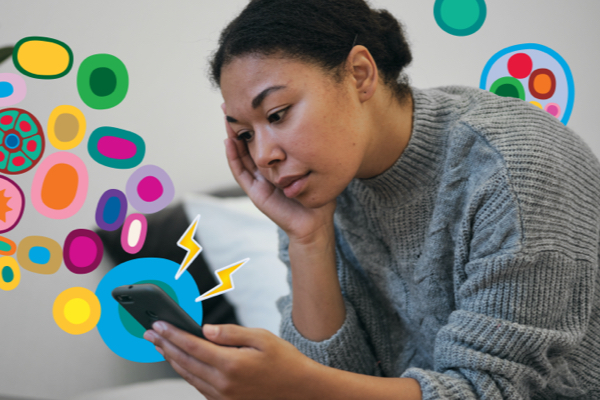The difference between worries and anxiety

Anxiety is when your stress or worries don’t go away and it’s hard to identify the cause. Often, anxiety can overwhelm your body and may lead to a lapse in concentration, less sleep or affect your ability to complete normal tasks.
According to a 2020–22 National Study of Mental Health and Wellbeing, 3.4 million Australians experienced anxiety disorders.
How do you tell the difference between natural worries and anxiety?
It’s normal to experience a small amount of anxiety throughout your life.
Anxiety or stress naturally occurs in your body as a response to danger also known as ‘fight or flight’. If your mind senses danger or a problem, it releases stress hormones such as adrenaline and cortisol, which help to keep you alert and better prepared to face challenges.
Worries can often be short term, and you may work through them in different ways. For example, you may worry about a presentation at work but then you realise you’ve presented many times and it calms your nerves. Over time you may become resilient to worries and develop effective coping strategies to work through problems. Most people can adapt well to stress or worries in short periods.
It’s important for you to establish a measure of what’s a normal amount of worry or stress and when it starts to overwhelm your life.
Anxiety can appear in different ways, and it changes from person to person. Let’s explore the different types of anxiety in detail.
Generalised anxiety disorder (GAD)
GAD is the most common form of anxiety disorder. People who experience GAD often have prolonged periods of uncontrollable and irrational worry about minor, everyday situations or events. Symptoms of GAD include:
restlessness
irritability
fatigue
irregular breathing
inability to concentrate
disturbed sleep.
Social anxiety disorder
Social anxiety disorder, otherwise known as ‘social phobia’, is the fear of embarrassment or negative judgement by others in public or social situations. Scenarios to trigger this condition include:
public speaking
being the centre of attention
social interactions like meals with friends or having to make small talk with strangers.
When put in these situations, people who experience social phobia may experience symptoms like:
sweating
trembling
blushing
stammered speech
nausea.
Panic disorder
Panic disorder is when a person experiences reoccurring panic attacks, which can be characterised by:
a pounding heart
shortness of breath
trembling
feeling choked
excessive sweating
dizziness
light-headedness
feeling faint
nausea.
Some people find that situations or locations (public speaking, flying) trigger their panic attacks and others experience their panic attacks are randomly.
As panic attacks worsen, people may begin to experience additional symptoms such as social avoidance out of fear it may bring on a panic attack.

24/7 Medibank Mental Health Support
Medibank health insurance members can chat to a mental health professional about how they feel and ask questions about a range of mental health concerns for themselves or a loved one and get guidance on what they can do next. Chat online or call 1800 644 325 anytime of the day or night, 7 days a week at no extra cost.~
Obsessive compulsive disorder (OCD)
People who experience OCD often worry, or ‘obsess’, over everyday things like germs, dirt, and orderliness. These could either be on the person’s mind 24/7, or brought on by a trigger caused by people, smells or their environment. ‘Compulsions’ are the behaviours a person carries out repetitively, sometimes in a particular pattern - to reduce or avoid anxiety. These actions could include excessive hand washing, cleaning or checking of locks.
Post-traumatic stress disorder (PTSD)
PTSD often occurs after a traumatic event where a person’s life or safety was in danger.
Examples include:
serious accident
disasters
physical abuse
sexual assault.
PTSD is when the feelings that hit during a traumatic event, such as fear, helplessness or horror, continue after the event. For people who experience PTSD it can be a challenge to manage the condition with everyday life, work and relationships.
Where to get help
If your life or someone else’s is in danger, call 000 immediately.
If you’re in distress and need help, call Lifeline on 13 11 14 for 24/7 crisis support.
For non-emergency support, your GP or regular health practitioner is often the best place to start. They will be able to assess your individual situation and recommend the best next steps for your recovery.
Medibank health insurance members can chat to a mental health professional about how they feel and ask questions about a range of mental health concerns for themselves or a loved one and get guidance on what they can do next. Chat online or call 1800 644 325 anytime of the day or night, 7 days a week at no extra cost.~
Remember that help is always available, no matter the situation.
How can we help?
I want to know how my cover supports mental health
I need help and want to talk
Related articles
Things you need to know
~Some referred services may involve out of pocket costs and waiting periods may apply.
While we hope you find this information helpful, please note that it is general in nature. It is not health advice, and is not tailored to meet your individual health needs. You should always consult a trusted health professional before making decisions about your health care. While we have prepared the information carefully, we can’t guarantee that it is accurate, complete or up-to-date. And while we may mention goods or services provided by others, we aren’t specifically endorsing them and can’t accept responsibility for them. For these reasons we are unable to accept responsibility for any loss that may be sustained from acting on this information (subject to applicable consumer guarantees).


